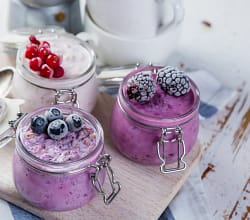Yogurt is popular for being a nutrient-dense snack that enjoyable to eat anytime of the day. But not all yogurts are created equal, and this is where kefir comes in. Kefir is a very thin, runny kind of yogurt that is made from a base of mixed bacteria and yeast. Most kinds of kefir are served in a bottle or gallon like regular milk. It comes in a variety of flavors and milk bases.
Kefir is well on its way to becoming a staple breakfast drink, growing more popular every day thanks to its numerous health benefits.
How are yogurt and kefir made?
Kefir and yogurt are very similar in their uses, flavor, and variety, but they are not the same dairy products.
Both kefir and yogurt go through a fermenting process before completion. Yogurt is almost always fermented by culturing, a process that allows healthy microbes to multiply in yogurt. This is done primarily to preserve the yogurt, which has a side effect of making the taste of the yogurt slightly more sour. This is also why yogurt is great for digestion, since it allows the introduction of helpful bacteria in your gut that helps break down food.
Kefir, alternatively, is fermented in a multistage process using kefir grain. Kefir grains are not actually wheat grains-they are a mixture of special bacteria and yeasts. As for the yogurt base, it comes from any milk base you can think of, even non-dairy milks like coconut and soy. Kefir ultimately ends up far thinner in texture than yogurt, which is why most people call it “drinkable yogurt”. It has a tangy, sour flavor and is a great source of protein, calcium, and vitamin A.
You can find kefir in most grocery stores, usually as a drinkable yogurt. On the other hand, it is best to find kefir grains through reputable online dealers such as Amazon.
Nutritional value of kefir
When choosing or making kefir, always opt for fat-free or low-fat kefir since they will be your healthiest options. It has a low amount of calories and sugar per serving, and contains plenty of nutrients.
Kefir’s combination of high protein, low calories, and calcium makes it an excellent morning side food or post-workout drink. It is highly rejuvenating and effective for both men and women of all ages. The taste of plain kefir can be unappealing to some, but this can be remedied with added flavors such as chocolate and raspberry.
Kefir is also great for those suffering from diabetes. A study in 2015 proved that a controlled group of type-2 diabetes sufferers who drank 2.5 cups of kefir per day had lower HbA1C readings than those in the control group. These blood sugar tests revealed that the participants had less overall blood sugar levels than the control group.
Kefir yogurt also helps promote a healthy gut since it contains many probiotics. Ironically, the introduction of these bacteria in your gut helps prevent the spread of unhealthy bacteria, so kefir has antibacterial properties.
Finally, kefir has proven benefits in both the formation of strong bones and significantly reducing LDL (bad) cholesterol. Its decent amount of vitamin A helps keep your eyes and heart healthy, while also potentially lowering your risk for certain cancers.
Kefir yogurt’s benefits in weight loss
Like most yogurts, kefir is great for weight loss thanks to its microbial effects on your gut. Consuming some kefir after hearty meals such as sandwiches and omelets helps break down the food, acting like fiber. It is arguably better than yogurt in this aspect since it is more liquid. The microbiota in your gut help you feel satisfied for much longer and reduce cravings, making it very effective in calorie restriction. Additionally, kefir contains protein and calcium to help your bones and muscles stay healthy.
It is important to note that kefir yogurt should be consumed in moderation. Drinking more than a cup of kefir during a meal can lead to some nasty stomach aches, thanks to the high amount of yeast found in it.
Is kefir yogurt better than other yogurt types?
Kefir yogurt and other yogurts like Greek yogurt are different foods and it is important to treat them as such.
The only real difference between the two lies in the fermenting process, as discussed earlier. Both are great foods for weight loss, protein, and probiotics.
Choose yogurt (preferably Greek yogurt, since it has more protein and less sugar than regular yogurt) if you want a quick snack to go along nicely with your breakfast or lunch. It has a very low chance of causing stomach pains and comes in even more creative flavors than kefir. Yogurt is also necessary for baking recipes that involve yogurt, since it has a thicker consistency. Greek yogurt pancakes and frozen yogurt are two popular uses for yogurt.
Since kefir is a hearty yogurt drink that contains lots of probiotics, you must consume it in moderation. Its strength compared to yogurt lies in its nutritional value. It has slightly more protein and less calories per serving than yogurt. It works best as a substitute for dairy milk. Keep in mind that both yogurt and kefir can have a base of either dairy or non-dairy milk.
Conclusion
Kefir yogurt is an amazing super drink that contains plenty of protein, calcium, vitamin A, and very little calories and sugar. It almost always comes served in a bottle or half-gallon like normal milk does. Compared to regular yogurt, kefir is much thinner, contains more probiotics, and works great as a high-protein drink that can be consumed at any time of the day.






